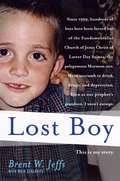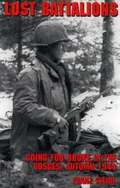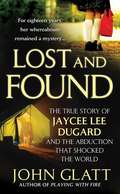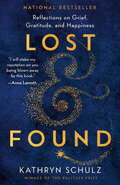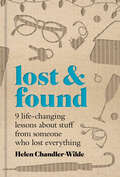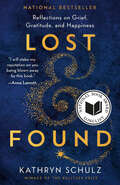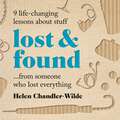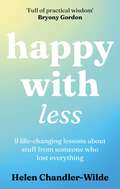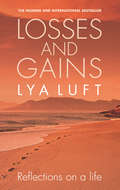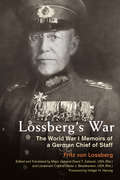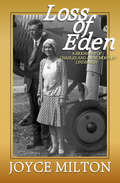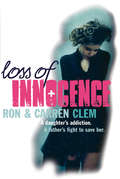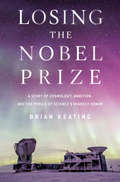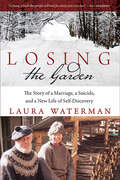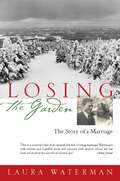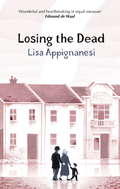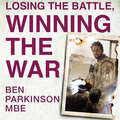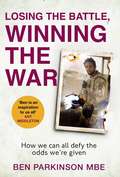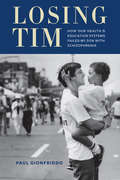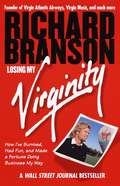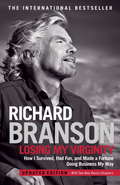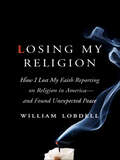- Table View
- List View
Lost Boy
by Maia Szalavitz Brent W. JeffsStarred Review. In this moving debut memoir, the nephew of a Mormon sect leader chronicles life in the Fundamentalist Church of Jesus Christ of Latter Day Saints, and what came after. Among a 10,000-member Mormon community, Jeffs grew up with three mothers, more than a dozen siblings, and a deep fear of the world outside of the church. Within the secretive community, Jeffs was taught that purity came from special attention to dress, hard work, generosity and, most importantly, obedience to one's elders (especially his uncle, the prophet Warren Jeffs). The focus of this fast-paced memoir is the sexual abuse Jeffs and his brothers endured at the hands of their relatives during church and school functions, for which he would file a class-action lawsuit in 2004. Jeffs's descent into depression proves the beginning of the end for his relationship with the church and, consequently, with much of his family. Jeffs outlines the core beliefs of the Church, along with the oppressive ends to which they were used, and the heartbreaking fate of those church members expelled into a society they were raised to see as evil and corrupt. This hard-to-put-down, tightly woven account pulls back the curtain on what's become a perennial news story, while illustrating the impiety of absolute power and the delicacy of innocence. Copyright Reed Business Information, a division of Reed Elsevier Inc. All rights reserved.
Lost Battalions: Going for Broke in the Vosges, Autumn 1944
by Franz SteidlThe story of two World War II battalions--one German, one American--each cut off behind enemy lines in the same forest at the same time, and the heroic efforts to save them.
Lost And Found: The True Story Of Jaycee Lee Dugard And The Abduction That Shocked The World
by John GlattThen, in August 2009, a registered sex offender named Phillip Garrido appeared on the University of California, Berkeley campus alongside two young women whose unusual behavior sparked concern among campus officials and law enforcement. That visit would pave the way for shocking discovery: that Garrido was Jaycee Lee Dugard's kidnapper... <p><p> Jaycee's story was revealed: For eighteen years, she had lived in an outbuilding on the Garrido property in Antioch, CA, just two hours away from her childhood home. Kept in complete isolation, she was raped by Garrido, who fathered her two daughters. When news broke of Jaycee's discovery, there was a huge outpouring of relief across the nation. But questions remain: How did the Garridos slip past authorities? And how did Jaycee endure her captivity? This is the story of a girl-next-door who was Lost and Found.
Lost Airmen: The Epic Rescue of WWII U.S. Bomber Crews Stranded Behind Enemy Lines
by Charles E. Stanley Jr.Late in 1944, thirteen U.S. B-24 bomber crews bailed from their cabins over the Yugoslavian wilderness. Bloodied and disoriented after a harrowing strike against the Third Reich, the pilots took refugee with the Partisan underground. But the Americans were far from safety. Holed up in a village barely able to feed its citizens, encircled by Nazis, and left abandoned after a team of British secret agents failed to secure their escape, the airmen were left with little choice. It was either flee or be killed. In The Lost Airmen, Charles Stanely Jr. unveils the shocking true story of his father, Charles Stanely-and the eighteen brave soldiers he journeyed with for the first time. Drawing on over twenty years of research, dozens of interviews, and previously unpublished letters, diaries, and memoirs written by the airmen, Stanley recounts the deadly journey across the blizzard-swept Dinaric Alps during the worst winter of the Twentieth Century-and the heroic men who fought impossible odds to keep their brothers in arms alive.
Lost & Found: Reflections on Grief, Gratitude, and Happiness
by Kathryn SchulzA Pulitzer Prize-winning New Yorker writer tells the story of losing her father and finding the love of her life in this profound meditation on grief and joy.Eighteen months before her beloved father died, Kathryn met Casey, the woman who would become her wife. Lost & Found weaves together their love story with Kathryn's story of losing her father in a brilliant exploration of the way families are lost and found and the ways life dispenses wretchedness and suffering, beauty and grandeur all at once. So much has been written about loss--and Schulz writes with painful clarity about the vicissitudes of grieving her father--but here she writes about the vital phenomenon of finding.The book is organized into three parts: "Lost," which explores the sometimes comic, sometimes frustrating, sometimes heartbreaking experience of losing things, grounded in Kathryn's account of her father's death; "Found," which examines the experience of discovery, from new ideas to new planets, grounded in her story of falling in love; and finally, "And," which contends with the way these events happen in conjunction and imply the inevitable: life keeps going on, not only around us but beyond us and after us. Kathryn Schulz has the ability to measure the depth and breadth of human experience with unusual exactness--she articulates the things all of us feel but have been unable to put into language. Lost & Found is a work of philosophical interrogation as well as a story about life, death and the discovery of one great love just as another is being lost.
Lost & Found: Nine life-changing lessons about stuff from someone who lost everything
by Helen Chandler-WildeWhy do we buy and keep the things we do, and how can we live a less cluttered life? Journalist Helen Chandler-Wilde dives deep to explore, explain, and guide us on the path to liberation from the tyranny of "too much."On New Year's Eve of 2018, Helen Chandler-Wilde lost everything she owned in a storage unit fire in Croydon, England, where she'd stowed all her possessions after a big breakup. She was left devastated and forced to re-evaluate her relationship with owning material things.In Lost & Found, she offers a profound mix of memoir, self-help, and journalism to explore the psychological reasons, sociological quirks of human nature, and fascinating science behind why we buy and hold onto things. Helen interviews people from all walks of life, including behavioral psychologists on the science of nostalgia, a nun on what it's like to own almost nothing, and consumer psychologists on why we spend impulsively, to help us better understand why we're surrounded by clutter and what we can do to change it.By the end of this smart-thinking book filled with lessons and engaging prompts to help us gain perspective on our buying habits and the value we place on what we already have, your relationship with your belongings will be changed forever. The perfect "new year, new you" read or gift for anyone who is downsizing, striving for a more sustainable lifestyle, or is eager to cultivate a minimalist mindset.
Lost & Found: A Memoir
by Kathryn SchulzAn enduring account of joy and sorrow from one of the great writers of our time, The New Yorker&’s Kathryn Schulz, winner of the Pulitzer Prize&“Our lives do indeed deserve and reward the kind of honest, gentle, brilliant scrutiny Schulz brings to bear on her own life. The book is profound and beautiful.&”—Marilynne Robinson, author of Housekeeping and GileadONE OF THE MOST ANTICIPATED BOOKS OF 2022—Oprah Daily, The Washington Post, Vogue, The Philadelphia Inquirer, Esquire, Chicago Review of Books, Town & Country, Electric Lit, The Rumpus, Lit HubEighteen months before Kathryn Schulz&’s beloved father died, she met the woman she would marry. In Lost & Found, she weaves the stories of those relationships into a brilliant exploration of how all our lives are shaped by loss and discovery—from the maddening disappearance of everyday objects to the sweeping devastations of war, pandemic, and natural disaster; from finding new planets to falling in love.Three very different American families form the heart of Lost & Found: the one that made Schulz&’s father, a charming, brilliant, absentminded Jewish refugee; the one that made her partner, an equally brilliant farmer&’s daughter and devout Christian; and the one she herself makes through marriage. But Schulz is also attentive to other, more universal kinds of conjunction: how private happiness can coexist with global catastrophe, how we get irritated with those we adore, how love and loss are themselves unavoidably inseparable. The resulting book is part memoir, part guidebook to living in a world that is simultaneously full of wonder and joy and wretchedness and suffering—a world that always demands both our gratitude and our grief.A staff writer at The New Yorker and winner of the Pulitzer Prize, Kathryn Schulz writes with curiosity, tenderness, erudition, and wit about our finite yet infinitely complicated lives. Crafted with the emotional clarity of C. S. Lewis and the intellectual force of Susan Sontag, Lost & Found is an uncommon book about common experiences.
Lost & Found: 9 life-changing lessons about stuff from someone who lost everything
by Helen Chandler-WildeAn exploration into why we keep holding on to material things and what they mean to usOn New Year's Eve of 2018, journalist Helen Chandler-Wilde lost everything she owned in a storage unit fire in Croydon, where she'd stowed all her possessions after a big break-up. She was left devastated, and forced to re-evaluate her relationship with owning material things. A mix of memoir, self-help and journalism, Lost & Found explores the psychological reasons for why we buy and keep the things we do, and explains how we can liberate ourselves from the tyranny of 'too much'. Helen interviews people from all walks of life, including behavioural psychologists on the science of nostalgia, a nun on what it's like to own almost nothing and consumer psychologists on why we spend impulsively, to help us better understand why we're surrounded by clutter and what we can do to change it.This smart-thinking book explains the sociological quirks of human nature and the fascinating science behind why we buy and hold onto things. By the end of it, your relationship with your belongings will be changed forever.
Lost & Found: 9 life-changing lessons about stuff from someone who lost everything
by Helen Chandler-WildeAn exploration into why we keep holding on to material things and what they mean to usOn New Year's Eve of 2018, journalist Helen Chandler-Wilde lost everything she owned in a storage unit fire in Croydon, where she'd stowed all her possessions after a big break-up. She was left devastated, and forced to re-evaluate her relationship with owning material things. A mix of memoir, self-help and journalism, Lost & Found explores the psychological reasons for why we buy and keep the things we do, and explains how we can liberate ourselves from the tyranny of 'too much'. Helen interviews people from all walks of life, including behavioural psychologists on the science of nostalgia, a nun on what it's like to own almost nothing and consumer psychologists on why we spend impulsively, to help us better understand why we're surrounded by clutter and what we can do to change it.This smart-thinking book explains the sociological quirks of human nature and the fascinating science behind why we buy and hold onto things. By the end of it, your relationship with your belongings will be changed forever.
Losses and Gains: Reflections on a Life with a Foreword by Paolo Coelho
by Lya Fett LuftIn her bestselling book Losses and Gains, Lya Luft draws on her own experiences of loss and gain in marriage and family to address the universal themes of childhood, love and maturity. She portrays love as the common thread through all phases of life. As children, the unconditional love we receive from our parents determines our expectations for all the other forms of love we experience later. And as adults, she argues, the complex task of loving another depends, initially, on self-love and self-esteem. Luft's ardent reflections on existence and the human spirit are a powerful reminder to us all: we have lost everything only when we believe we deserve less than everything still to be gained.
Lossberg's War: The World War I Memoirs of a German Chief of Staff (Foreign Military Studies)
by Fritz von Lossberg&“This book is a work of detail and scholars can now envision the campaigns and battles of the First World War from a high-level German perspective.&” —Journal of Military History Gen. Fritz von Lossberg (1868-1942) directed virtually all the major German defensive battles on the Western Front during the First World War. Hailed as &“the Lion of the Defensive,&” he was an extremely influential military tactician and, unlike many other operations officers of his era, was quick to grasp the changes wrought by technology. Now available for the first time in English, Lossberg&’s memoir explains how he developed, tested, and implemented his central principles—flexibility, decentralized control, and counterattack—which were based on a need to adapt to shifting conditions on the battlefield. Lossberg first put his theory of elastic defense combined with defense-in-depth into practice during the Battle of Arras (April-May 1917), where it succeeded. At the Battle of Passchendaele (June-November 1917), his achievements on the field proved the feasibility of his strategy of employing a thinly manned front line that minimized the number of soldiers exposed to artillery fire. Lossberg&’s tactical modernizations have become essential components of army doctrine, and Lossberg&’s War: The World War I Memoirs of a German Chief of Staff will take readers inside the mind of one of the most significant military innovators of the twentieth century. &“Make no mistake about it, the appearance of this book is one of the most significant Great War publishing events of the year. It deserves to be on the shelf of every serious student of this titanic conflict.&” —Stand To!
Loss of Eden: A Biography of Charles and Anne Morrow Lindbergh
by Joyce MiltonFor the first time, Joyce Milton gives us the dual biography of the wonder couple, Charles and Anne Morrow Lindbergh. Their love prevailed against a horrifying kidnapping and murder splashed throughout the media, their careers, and even the criticism they underwent following their involvement in the America First movement as the United States entered World War II. With new information presented about their son&’s kidnapper, Bruno Hauptmann, and Charlie&’s own role in the case, Milton gives her readers a lot to think about. Thoroughly researched, Milton exposes a new understanding of and view into the personalities and lives of Charles, Anne, and the time they lived in.
Loss Of Innocence: A daughter's addiction. A father's fight to save her.
by Carren Clem Ron ClemThe Clems were a family living the American dream until their fifteen-year-old daughter Carren became addicted to Meth. Within two months of first taking the highly addictive drug, Carren had moved out of the family home, spent her entire savings on Meth and resorted to stealing, dealing and prostitution to pay for her habit. Told from both Carren's perspective and from the perspective of her father Ron, Loss of Innocence shares the shocking story of how a middle-class girl growing up in a stable home could get so lost. A former LA police officer, Ron describes how he went back to being a cop to try to rescue his daughter and how he suffered a heart attack in the street when he witnessed Carren selling herself to a drug dealer; Carren shares the events leading up to her first taste of drugs, and her descent into addiction with moving candour and dignity.Carren is now clean and sober, and in this frank, compelling book she and her family prove that there can be life after drug addiction.
Losing the Nobel Prize: A Story Of Cosmology, Ambition, And The Perils Of Science's Highest Honor
by Brian KeatingThe inside story of a quest to unlock one of cosmology’s biggest mysteries, derailed by the lure of the Nobel Prize. What would it have been like to be an eyewitness to the Big Bang? In 2014, astronomers wielding BICEP2, the most powerful cosmology telescope ever made, revealed that they’d glimpsed the spark that ignited the Big Bang. Millions around the world tuned in to the announcement broadcast live from Harvard University, immediately igniting rumors of an imminent Nobel Prize. But had these cosmologists truly read the cosmic prologue or, swept up in Nobel dreams, had they been deceived by a galactic mirage? In Losing the Nobel Prize, cosmologist and inventor of the BICEP (Background Imaging of Cosmic Extragalactic Polarization) experiment Brian Keating tells the inside story of BICEP2’s mesmerizing discovery and the scientific drama that ensued. In an adventure story that spans the globe from Rhode Island to the South Pole, from California to Chile, Keating takes us on a personal journey of revelation and discovery, bringing to vivid life the highly competitive, take-no-prisoners, publish-or-perish world of modern science. Along the way, he provocatively argues that the Nobel Prize, instead of advancing scientific progress, may actually hamper it, encouraging speed and greed while punishing collaboration and bold innovation. In a thoughtful reappraisal of the wishes of Alfred Nobel, Keating offers practical solutions for reforming the prize, providing a vision of a scientific future in which cosmologists may, finally, be able to see all the way back to the very beginning.
Losing the Garden: The Story of a Marriage, a Suicide, and a New Life of Self-Discovery (Excelsior Editions)
by Laura WatermanIn 1971, Laura and Guy Waterman left New York City for thirty-seven acres in Vermont, where they would live in a hand-built cabin without running water or electricity for the next thirty years. It was a life based largely in the nineteenth century, a life of hauling their own water and growing their own food, of lighting candles in the evening and heating their cabin with wood from the surrounding forest. Combined with the trail tending they did in the alpine zone of the White Mountains and the books they wrote about environmental stewardship, it made for a rewarding, healthy, and fruitful existence. But that was only part of their story. Guy's depression was another part, and his ultimate decision to take his own life on the wintry summit of Mount Lafayette—a decision he made with Laura's support—was the crux, a term climbers use to describe the hardest move on the climb. Being a climber herself, Laura had to confront the crux. This meant taking a close look at Guy's suicide and asking herself a hard question: How, or why, had she come to support the decision of the man she loved? In Losing the Garden, Laura Waterman comes to terms with her husband's long depression and the complex nature of a gifted, humorous man who was driven by obsession, self-absorption, and a strange lack of confidence. Her account of her own marriage, idyllic from the outside but riddled from within, is nonetheless a love story, a portrait of an intense and unusual marriage, and an affirmation of life after loss.
Losing the Garden: The Story of a Marriage
by Laura WatermanIn 1971, Laura and Guy Waterman decided to give up all the conveniences of life and live self-sufficiently for the land, in a cabin in the mountains of Vermont. For nearly three decades they created a deliberate life, eating food they grew themselves and using no running water or electricity. Losing The Garden is an honest account of their marriage, seen as idyllic but riddled from within, as well as the event that would end it - the day Guy climbed a summit and sat down among the rocks to die.This is the memoir of a woman who was compelled to ask herself, "How could I support my husband's plan to commit suicide?" In her intimate examination, we explore the intricate and dark family histories of this couple, and reach a deep understanding of the marriage that tried to transcend them. At its heart, this is a love story and an affirmation of life after loss.
Losing the Dead (Vmc Ser. #103)
by Lisa AppignanesiAs her mother slipped into the darkness of old age, Lisa Appignanesi began to realise how little she knew of the reality behind the tales she had heard since childhood. She had shunned her parents' stories of war-time Poland, but now she set out to find the truth. In her quest she flew to Warsaw - imagining and revisiting a past she never knew.This is the moving story of the Jews who survived outside the camps, but it is also the author's own voyage of self-discovery - a family memoir of the rites of passage of emigration, childhood, and growing up an outsider in a closed community
Losing the Dead (Vmc Ser. #103)
by Lisa AppignanesiAs her mother slipped into the darkness of old age, Lisa Appignanesi began to realise how little she knew of the reality behind the tales she had heard since childhood. She had shunned her parents' stories of war-time Poland, but now she set out to find the truth. In her quest she flew to Warsaw - imagining and revisiting a past she never knew.This is the moving story of the Jews who survived outside the camps, but it is also the author's own voyage of self-discovery - a family memoir of the rites of passage of emigration, childhood, and growing up an outsider in a closed community
Losing the Battle, Winning the War: The story of the most injured soldier to have survived Afghanistan
by Ben Parkinson'A great and inspiring book from Doncaster's bravest son. Read it in a day' - Jeremy Clarkson 'Ben is the embodiment of positive thinking. What he has achieved, in large part through willpower, is nothing short of miraculous. An inspiration to us all' - Ant Middleton The story of Ben Parkinson MBE, the most injured soldier to have survived Afghanistan---What were you doing when you were 22? Where were you in the world? What did you want to do with your life? Ben Parkinson was a 6'4" Paratrooper. He was in Afghanistan fighting for his country. He wanted to always be a soldier, to be a father and to get home in one piece. But we don't always get what we want. So the question is: how do we react when that happens? Easy: You find something new to fight for.Ben Parkinson MBE is an inspiration to everyone. He suffered 37 injuries when his Land Rover hit a mine in Helmand in 2006, including brain damage, breaking his back and losing both his legs. This book follows the story of what led him to that moment his life changed forever - and what happened next. Doctors didn't think Ben could survive the trauma - then they didn't think he would wake up, or talk again, or walk again. Time after time, Ben pushed the ceiling on what was possible, going on to carry the Olympic flame in 2012 and receiving an MBE for the enormous feats he has undertaken for charity.What he has achieved in the face of adversity - for others as well as for himself - is nothing short of a miracle. Nerve-wracking, heart-warming and full of classic soldier's humour, Losing the Battle, Winning the War is a book you'll be thinking about long after the last page. 'Ben Parkinson is my hero. His story is one of immeasurable courage and character, a testament to the extraordinary resilience of the human spirit' Dan Jarvis MP, author of Long Way Home
Losing the Battle, Winning the War: How we can all defy the odds we're given
by Ben Parkinson'A great and inspiring book from Doncaster's bravest son. Read it in a day' - Jeremy Clarkson 'Ben is the embodiment of positive thinking. What he has achieved, in large part through willpower, is nothing short of miraculous. An inspiration to us all' - Ant Middleton The story of Ben Parkinson MBE, the most injured soldier to have survived Afghanistan---What were you doing when you were 22? Where were you in the world? What did you want to do with your life? Ben Parkinson was a 6'4" Paratrooper. He was in Afghanistan fighting for his country. He wanted to always be a soldier, to be a father and to get home in one piece. But we don't always get what we want. So the question is: how do we react when that happens? Easy: You find something new to fight for.Ben Parkinson MBE is an inspiration to everyone. He suffered 37 injuries when his Land Rover hit a mine in Helmand in 2006, including brain damage, breaking his back and losing both his legs. This book follows the story of what led him to that moment his life changed forever - and what happened next. Doctors didn't think Ben could survive the trauma - then they didn't think he would wake up, or talk again, or walk again. Time after time, Ben pushed the ceiling on what was possible, going on to carry the Olympic flame in 2012 and receiving an MBE for the enormous feats he has undertaken for charity.What he has achieved in the face of adversity - for others as well as for himself - is nothing short of a miracle. Nerve-wracking, heart-warming and full of classic soldier's humour, Losing the Battle, Winning the War is a book you'll be thinking about long after the last page. 'Ben Parkinson is my hero. His story is one of immeasurable courage and character, a testament to the extraordinary resilience of the human spirit' Dan Jarvis MP, author of Long Way Home
Losing the Battle, Winning the War: How we can all defy the odds we're given
by Ben Parkinson'Ben is the embodiment of positive thinking. What he has achieved, in large part through willpower, is nothing short of miraculous. An inspiration to us all' - Ant Middleton 'A great and inspiring book from Doncaster's bravest son. Read it in a day' - Jeremy Clarkson The story of Ben Parkinson MBE, the most injured soldier to have survived Afghanistan---What were you doing when you were 22? Where were you in the world? What did you want to do with your life? Ben Parkinson was a 6'4" Paratrooper. He was in Afghanistan fighting for his country. He wanted to always be a soldier, to be a father and to get home in one piece. But we don't always get what we want. So the question is: how do we react when that happens? Easy: You find something new to fight for.Ben Parkinson MBE is an inspiration to everyone. He suffered 37 injuries when his Land Rover hit a mine in Helmand in 2006, including brain damage, breaking his back and losing both his legs. This book follows the story of what led him to that moment his life changed forever - and what happened next. Doctors didn't think Ben could survive the trauma - then they didn't think he would wake up, or talk again, or walk again. Time after time, Ben pushed the ceiling on what was possible, going on to carry the Olympic flame in 2012 and receiving an MBE for the enormous feats he has undertaken for charity.What he has achieved in the face of adversity - for others as well as for himself - is nothing short of a miracle. Nerve-wracking, heart-warming and full of classic soldier's humour, Losing the Battle, Winning the War is a book you'll be thinking about long after the last page.
Losing Tim: How Our Health and Education Systems Failed My Son with Schizophrenia
by Paul GionfriddoPaul Gionfriddo's son Tim is one of the "6 percent"—an American with serious mental illness. He is also one of the half million homeless people with serious mental illnesses in desperate need of help yet underserved or ignored by our health and social-service systems.In this moving, detailed, clear-eyed exposé, Gionfriddo describes how Tim and others like him come to live on the street. Gionfriddo takes stock of the numerous injustices that kept his son from realizing his potential from the time Tim first began to show symptoms of schizophrenia to the inadequate educational supports he received growing up, his isolation from family and friends, and his frequent encounters with the juvenile justice system and, later, the adult criminal-justice system and its substandard mental health care. Tim entered adulthood with limited formal education, few work skills, and a chronic, debilitating disease that took him from the streets to jails to hospitals and then back to the streets. Losing Tim shows that people with mental illness become homeless as a result not of bad choices but of bad policy. As a former state policy maker, Gionfriddo concludes with recommendations for reforming America's ailing approach to mental health.
Losing My Virginity: How I've Survived, Had Fun, and Made a Fortune Doing Business My Way
by Richard Branson"Oh, screw it, let's do it." That's the philosophy that has allowed Richard Branson, in slightly more than twenty-five years, to spawn so many successful ventures. From the airline business (Virgin Atlantic Airways), to music (Virgin Records and V2), to cola (Virgin Cola), to retail (Virgin Megastores), and nearly a hundred others, ranging from financial services to bridal wear, Branson has a track record second to none. Losing My Virginity is the unusual, frequently outrageous autobiography of one of the great business geniuses of our time. When Richard Branson started his first business, he and his friends decided that "since we're complete virgins at business, let's call it just that: Virgin." Since then, Branson has written his own "rules" for success, creating a group of companies with a global presence, but no central headquarters, no management hierarchy, and minimal bureaucracy. Many of Richard Branson's companies--airlines, retailing, and cola are good examples--were started in the face of entrenched competition. The experts said, "Don't do it." But Branson found golden opportunities in markets in which customers have been ripped off or underserved, where confusion reigns, and the competition is complacent. And in this stressed-out, overworked age, Richard Branson gives us a new model: a dynamic, hardworking, successful entrepreneur who lives life to the fullest. Family, friends, fun, and adventure are equally important as business in Branson's life. Losing My Virginity is a portrait of a productive, sane, balanced life, filled with rich and colorful stories: Crash-landing his hot-air balloon in the Algerian desert, yet remaining determined to have another go at being the first to circle the globe Signing the Sex Pistols, Janet Jackson, the Rolling Stones, Boy George, and Phil Collins Fighting back when British Airways took on Virgin Atlantic and successfully suing this pillar of the British business establishment Swimming two miles to safety during a violent storm off the coast of Mexico Selling Virgin Records to save Virgin Atlantic Staging a rescue flight into Baghdad before the start of the Gulf War ... And much more. Losing My Virginity is the ultimate tale of personal and business survival from a man who combines the business prowess of Bill Gates and the promotional instincts of P. T. Barnum.
Losing My Virginity: How I've Survived, Had Fun, and Made a Fortune Doing Business My Way
by Richard Branson"Oh, screw it, let's do it."That's the philosophy that has allowed Richard Branson, in slightly more than twenty-five years, to spawn so many successful ventures. From the airline business (Virgin Atlantic Airways), to music (Virgin Records and V2), to cola (Virgin Cola), to retail (Virgin Megastores), and nearly a hundred others, ranging from financial services to bridal wear, Branson has a track record second to none.Losing My Virginity is the unusual, frequently outrageous autobiography of one of the great business geniuses of our time. When Richard Branson started his first business, he and his friends decided that "since we're complete virgins at business, let's call it just that: Virgin." Since then, Branson has written his own "rules" for success, creating a group of companies with a global presence, but no central headquarters, no management hierarchy, and minimal bureaucracy.Many of Richard Branson's companies--airlines, retailing, and cola are good examples--were started in the face of entrenched competition. The experts said, "Don't do it." But Branson found golden opportunities in markets in which customers have been ripped off or underserved, where confusion reigns, and the competition is complacent. And in this stressed-out, overworked age, Richard Branson gives us a new model: a dynamic, hardworking, successful entrepreneur who lives life to the fullest. Family, friends, fun, and adventure are equally important as business in Branson's life. Losing My Virginity is a portrait of a productive, sane, balanced life, filled with rich and colorful stories: Crash-landing his hot-air balloon in the Algerian desert, yet remaining determined to have another go at being the first to circle the globeSigning the Sex Pistols, Janet Jackson, the Rolling Stones, Boy George, and Phil CollinsFighting back when British Airways took on Virgin Atlantic and successfully suing this pillar of the British business establishmentSwimming two miles to safety during a violent storm off the coast of MexicoSelling Virgin Records to save Virgin AtlanticStaging a rescue flight into Baghdad before the start of the Gulf War . . .And much more. Losing My Virginity is the ultimate tale of personal and business survival from a man who combines the business prowess of Bill Gates and the promotional instincts of P. T. Barnum.Also available in the UK from Virgin Publishing, and in Canada from General Publishing,From the Hardcover edition.
Losing My Religion: How I Lost My Faith Reporting on Religion in America—and Found Unexpected Peace
by William LobdellWilliam Lobdell's journey of faith—and doubt—may be the most compelling spiritual memoir of our time. Lobdell became a born-again Christian in his late 20s when personal problems—including a failed marriage—drove him to his knees in prayer. As a newly minted evangelical, Lobdell—a veteran journalist—noticed that religion wasn't covered well in the mainstream media, and he prayed for the Lord to put him on the religion beat at a major newspaper. In 1998, his prayers were answered when the Los Angeles Times asked him to write about faith. Yet what happened over the next eight years was a roller-coaster of inspiration, confusion, doubt, and soul-searching as his reporting and experiences slowly chipped away at his faith. While reporting on hundreds of stories, he witnessed a disturbing gap between the tenets of various religions and the behaviors of the faithful and their leaders. He investigated religious institutions that acted less ethically than corrupt Wall St. firms. He found few differences between the morals of Christians and atheists. As this evidence piled up, he started to fear that God didn't exist. He explored every doubt, every question—until, finally, his faith collapsed. After the paper agreed to reassign him, he wrote a personal essay in the summer of 2007 that became an international sensation for its honest exploration of doubt.Losing My Religion is a book about life's deepest questions that speaks to everyone: Lobdell understands the longings and satisfactions of the faithful, as well as the unrelenting power of doubt. How he faced that power, and wrestled with it, is must reading for people of faith and nonbelievers alike.
